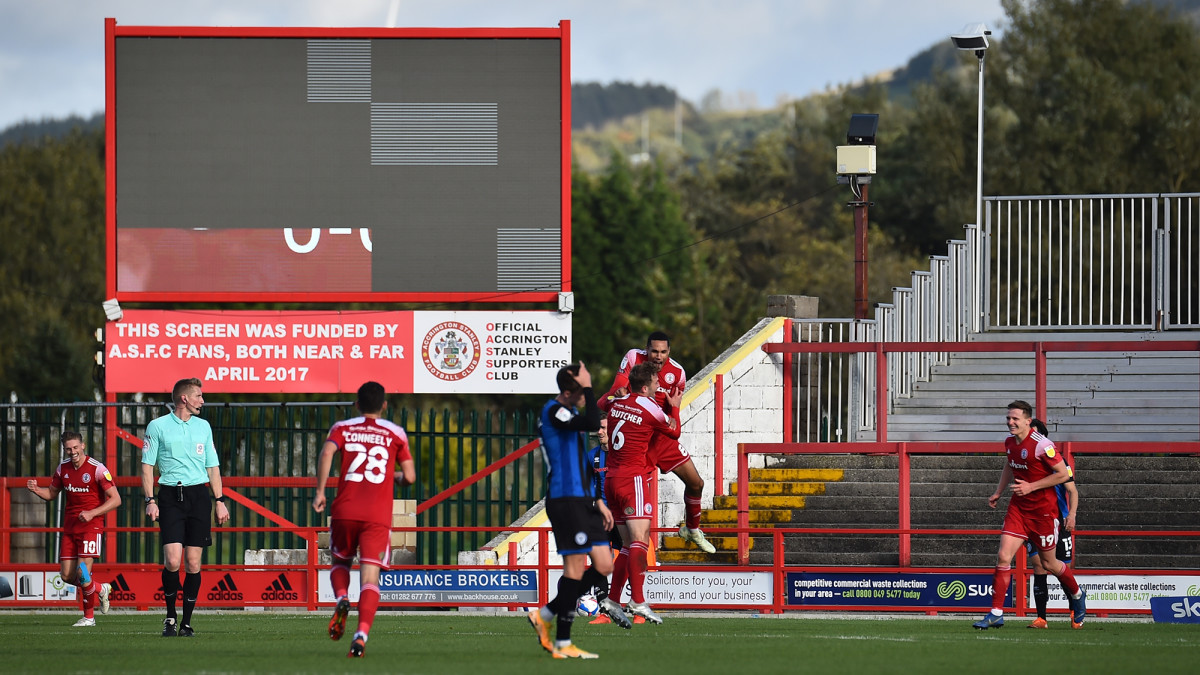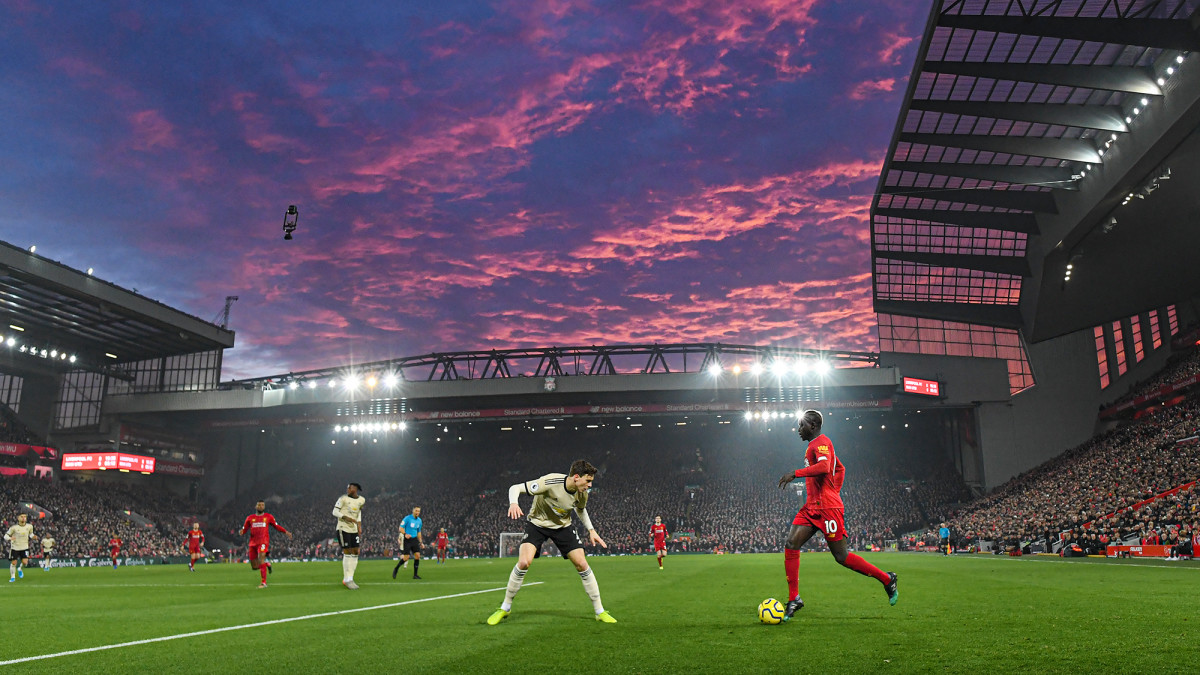Greed Among the Premier League's Elite Underlies the Plan to Help Lower-Level Clubs
Football in England below the elite level is in crisis. Bury went out of business last season even before the pandemic, and Macclesfield was tipped over the edge last month. Estimates vary but, without their major sources of income–match-going fans–as a result of COVID-19 restrictions, it’s thought that around a quarter of professional clubs below the Premier League level are in serious financial straits. If an environment that has existed for over a century is not to be devastated, then a major bailout is needed.
That’s why leading clubs have put together Project Big Picture–the package revealed in the Telegraph on Sunday–although nobody should think Liverpool and Manchester United, the two clubs leading the charge, are acting out of charity. Were the plans to be instituted, it would represent the biggest shakeup in the English game since the Premier League was formed in 1992.
But before getting into the details of the proposal, it’s perhaps worth explaining some of the background. There are 92 league clubs in England (including some from Wales, although there is a separate Welsh league), and the majority of the sides at the top level of the National League (the highest tier of non-League) are essentially professional. This is far more than any equivalent European country, and there are those who believe a process of rationalization would be beneficial.
That, though, is to ignore the roles smaller clubs have both in youth development and, more importantly, as hubs of their local communities. It may not be efficient, but the glory of English football, at least as much as the Premier League, is that every town has its team and they are all linked in a vast pyramid. This is why the suggestion last week by Manchester City CEO Ferran Soriano that Premier League B teams should be admitted to the English Football League drew such howls of fury: far rather every small town in Lancashire has its own side than that City has two (and maybe if City stopped buying so many players, they wouldn’t need a second side to fit them in).
The EFL has begged the government for help, but the Secretary of State for Culture, Media and Sport, Oliver Dowden has long since proved himself a shameless careerist who prefers to deal in the popular image of footballers as overpaid wasters rather than investigating the reality of life below the elite level. He was part of a cabinet calling on Premier League footballers to “help out” in the early days of the crisis, even as Marcus Rashford was shaming the government into extended school meal provisions through the summer holidays and Jordan Henderson was organizing donations to the National Health Service.
Dowden has said the EFL should be supported by handouts from Premier League clubs, a logic that, as Crystal Palace chairman Steve Parrish has pointed out, the government would never extend to supermarkets. The Department for Culture, Media and Sport has put together a $335 million rescue package for theaters, cinemas, museums and concert venues while allowing limited attendance, yet there is a feeling among clubs that he will not even consider proposals partially to reopen sporting venues.
Yet some sort of bailout is necessary, because football clubs are not normal businesses. They have a social function that, frankly, should have been recognized by the government far earlier so they could have been protected from the feckless short-term ownership (and in some cases base criminality) that has ruined so many over the past few decades. And part of the reason for the current crisis is that the division of revenues between top and bottom is so iniquitous.

The proposal released on Sunday, put together by Manchester United co-owner Joel Glazer and Liverpool lead owner John Henry and supported by EFL chief executive Rick Parry, does address that. This is a plan that long pre-dates the coronavirus crisis. Chelsea has been involved for some time; Manchester City, Arsenal and Tottenham were consulted last week. Along with a roughly $326 million lump sum to help with the immediate problem, it proposes 25% of all future Premier League television revenues be distributed to the EFL (as opposed to the present figure of 8%). That sounds promising, bridging the enormous gap that exists between the Premier League and Championship–the existence of which is what has driven so many clubs into financial difficulty as they speculate to try to vault into the top flight.
But it comes at an enormous cost–and not to Liverpool or United. It would do away with parachute payments (the extra payments given to sides relegated from the Premier League to help them readjust to the lower income of the Championship) and the EFL Cup. It would also reduce the size of the Premier League to 18 teams, as was intended in 1992. The 25% handover starts to look less generous when you reduce the number of clubs sharing out the rest by 10%. But those are proposals that have been discussed before and whose merits can be debated. The proposals also include a salary cap for the lower leagues and payments to cover FA losses and donations to the Women’s League and grassroots.
What is new, and appalling, is the proposal to revise the voting structure of the league. At present, each club in the Premier League has an equal vote (and, crucially, the Football Association has a “golden share” that gives it some right of veto, although it has historically been reluctant to use it) and proposals require two-thirds backing to pass. This plan would give preferential voting rights to the nine longest-serving members of the Premier League–Liverpool, Manchester City, Manchester United, Chelsea, Tottenham, Arsenal, Everton, Southampton and West Ham–enabling any six of them to pass and veto certain proposals, including those relating to broadcast deals and changes to “cost control rules and regulations.” They would also be able to veto takeovers of other clubs by prospective new owners (which is of questionable legality).
The membership of that nine is bizarre. There is the established Big Six, plus Everton, which was one of the five who led the breakaway in 1992. But Southampton and West Ham have never won the league, and even their own fans might struggle to make a case for them being among the nine biggest clubs in England. To go by historical success, Aston Villa, Sunderland, Newcastle and Sheffield Wednesday might feel aggrieved to be left out; by recent success, Leicester; by average attendance, Newcastle and Villa. If this cut-off had come four years ago, Sunderland and Stoke City would have been in ahead of Southampton. Newcastle has been a part of all but three Premier League seasons, which you might think would count for more than when a team was last promoted.
The point is, drawing a line now is arbitrary. Even a decade ago, Manchester City and Tottenham would never have been considered an automatic part of an elite group; two decades ago, neither would Chelsea. Thoughts go back to Bolton Wanderers chairman Phil Gartside proposing a Premier League 2 with no relegation. Bolton now sits in the fourth flight. Volatility, the fact any club can rise and (almost) any club can fall, is part of the beauty of the English game. Reifying a small cabal at the top in perpetuity runs counter to the ethos that has sustained English football, despite capital’s various assaults upon it, since the league became properly national in 1890.

Look beyond the initial charity, and this is a naked power grab by the elite clubs (and little of the aid it is offering will come from their own pockets). The Premier League itself condemned the fact discussions had not been conducted through “the proper channels” and spoke of “a damaging impact on the whole game.” Even the Department of Culture, Media and Sports has recognized that, as it said in a statement on Sunday: “We are surprised and disappointed that at a time of crisis when we have urged the top tiers of professional football to come together and finalize a deal to help lower league clubs there appear to be backroom deals being cooked up that would create a closed shop at the very top of the game.”
It doesn’t take much imagination to see what that closed shop with its preferential voting rights may be considering. The structure of the Champions League is likely to undergo significant changes beginning in 2024-25. Numerous proposals have been discussed over the past few months that would increase the power and wealth of the superclubs. Liverpool and United both have seats on the board of the European Clubs Association (as does Arsenal; Man City, Chelsea and Spurs do not), which has been leading the drive for change. Parry–former CEO of Liverpool and the first CEO of the Premier League, was on the first elected ECA board in 2008–his role and whether he has been acting in the best interest of the EFL is sure to be questioned in the coming days.
Reducing the number of Premier League teams and abolishing the EFL Cup would create space for more Champions League games, and for all the bleating about fixture congestion, no club is ever willingly going to give up matches that make money, which is why the Premier League has never been trimmed to fewer than 20 teams. A revised voting structure would make it easier for the elite to amend structures to permit more European games.
The elite clubs last year got their own way on overseas broadcast rights. Whereas previously they had been divided equally, now the elite takes more. Greed underlies everything, as was demonstrated by last week's announcement that fans will now have to pay nearly $20 per game to watch those behind-closed-door matches that would not otherwise be televised–even if they have already paid for a season ticket to watch them at the stadium (of Premier League clubs, only Leicester voted against it). To think that the elite clubs would not use their increased power to divert more and more funds to themselves, and thus further tilt the already shamefully unbalanced playing field, is naïve.
The good of the game–the fact that the best football is that played between two sides of roughly equivalent ability, the right of any person anywhere in the country to have their own team that might in some way be competitive–would be lost. A super league of a small handful of European super clubs would be the only logical endpoint.
Given present voting structures, it’s hard to see how these proposals could ever be voted through, unless there is a serious threat of a breakaway as there was in 1992 (the elite perhaps rejoining the EFL?). But that doesn’t alter the need for financial aid for the lower leagues. The goal should be, in the short term, to achieve that, and in the slightly longer term to amend the structure so the mass of clubs never again become beggars scrabbling around for crumbs beneath the rich man’s table. That goal is probably impossible, but the hunger of the many shouldn’t mean the few securing their seats at the top table forever.
